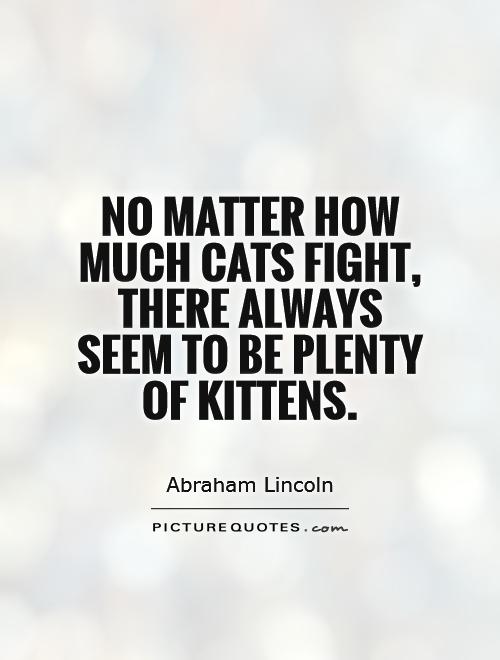No matter how much cats fight, there always seem to be plenty of kittens

No matter how much cats fight, there always seem to be plenty of kittens
Abraham Lincoln, the 16th President of the United States, was a man who understood the complexities of conflict and the inevitability of new beginnings. His leadership during the Civil War and his efforts to unite a divided nation are well-documented, but perhaps less known is his fondness for cats.Lincoln was known to be a cat lover, often seen with his beloved feline companions around the White House. He once said, “I am fond of pigs. Dogs look up to us. Cats look down on us. Pigs treat us as equals.” This quote reflects his admiration for the independent and sometimes aloof nature of cats.
The phrase “No matter how much cats fight, there always seem to be plenty of kittens” can be interpreted in many ways, but in the context of Abraham Lincoln, it speaks to his understanding of the cyclical nature of conflict and renewal. Just as cats may fight and squabble, but ultimately continue to reproduce and thrive, so too do nations and societies experience periods of strife and discord, only to emerge stronger and more resilient.
During Lincoln’s presidency, the United States was torn apart by the Civil War, a conflict that pitted brother against brother and threatened to tear the nation asunder. Despite the immense challenges he faced, Lincoln remained steadfast in his commitment to preserving the Union and ending the scourge of slavery. His leadership and vision ultimately led to the abolition of slavery and the reunification of the country.
In the aftermath of the war, the nation faced the daunting task of rebuilding and healing the wounds of division. Just as cats continue to produce kittens despite their disagreements, so too did the United States begin the process of reconstruction and reconciliation. Lincoln’s legacy as a unifier and a healer continues to inspire generations of Americans to work towards a more perfect union.












 Friendship Quotes
Friendship Quotes Love Quotes
Love Quotes Life Quotes
Life Quotes Funny Quotes
Funny Quotes Motivational Quotes
Motivational Quotes Inspirational Quotes
Inspirational Quotes